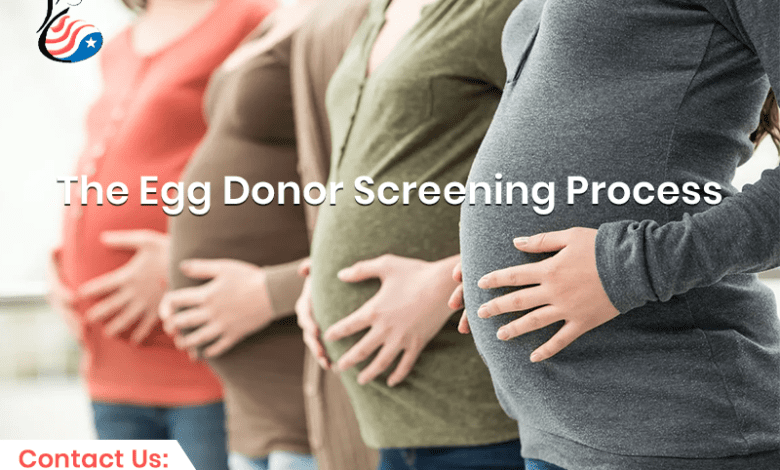What is the egg donor screening process?

When it comes to egg donation, people have all kinds of doubts and preconceived notions. The egg donation process is pretty straightforward but it’s a good idea to learn about the entire procedure ahead of time to avoid any surprises at appointment time. You should also check all the female egg donor requirements before going for the actual screening. There are also questions like “how much money can you get for donating eggs” or the egg donor price. You should note that the actual price may vary based on several factors but the average price may be between $5000 to $8000.
Here, you will know all the important things that are part of women’s egg donation process!
What Are the Different Types of Tests That Happen During the Screening Process?
The egg donor screening process including various important elements such as psychological disorders, infectious diseases, pelvic abnormalities, or any other genetic conditions that may affect the child. Apart from this, there is also an in-depth interview with the prospective donors before the actual screening and evaluation begins.
● Interview: An interview with the prospective donor is the first and most important step in the donor screening process. This is done after screening and selecting an application from a potential donor. Once the team is satisfied with the application, they call the prospective donor for a face-to-face interview. At this stage, all the doubts of the egg donor are also clarified.
● Blood Tests and Drug Tests: Once the interview is over, the prospective donor will be asked to take a blood test and undergo a drug test. If all goes well at this stage, the donor is listed for the parents to check and review the profile.
● Testing For Genetic Diseases: Genetic testing is also done as part of the screening process. This is done to ensure that no serious genetic diseases are passed on to the child after birth. The results of these tests usually come within a few weeks.
● Sonogram: A sonogram is performed to perform an evaluation and count of antral follicles. This is done after the parents select the donor profile. This process ensures that the donor is physically fit to produce and donate eggs.
● Testing For Infectious Diseases: The egg donor is also tested for infectious diseases in the lab. Results usually come within 10 days after the screening is done.
● Psychological Assessment: A thorough psychological examination also takes place to ensure that the egg donor is mentally prepared and willing to donate eggs. In some cases, it can be an emotional process, so psychological testing is an important part of the screening process.
Does Donating Eggs Cause Infertility?
Egg donation does not affect your future fertility. Naturally, hundreds of oocytes are lost each cycle, because only one matures. The hormonal treatment carried out with the donation consists in the maturation of a larger number of oocytes that would otherwise be lost. In addition, the gynecological examination carried out before the treatment is very comprehensive and allows any change that would otherwise go unnoticed to be identified.
Who Is An Egg Recipient?
We know that the recipient of ovules is the person who receives oocytes from another woman because her own gametes are not able to achieve a proper pregnancy. A female recipient has to use this method because she no longer has eggs in her ovaries, or because her gametes are not suitable for pregnancy. When a woman is faced with difficulty conceiving, it is recommended that she first go to her usual gynecologist so that he can perform all the necessary tests to determine the presence of a fertility problem, and determine the reason behind it. When the source of infertility is female, and it is found in the inability of the ovules to achieve pregnancy, it becomes necessary to use third parties to use their ovules.
What Requirements Must All Egg Donors Meet?
The law around the world regarding the requirements of women donating eggs is different. However, in other words, women donating eggs must meet the following requirements:
● Egg donation is a voluntary and informed process. Therefore, the donor must know all the details of the process before starting it and must show his consent by signing the relevant documentation.
● All women over 18 and under 34 years of age can donate oocytes.
● The egg donor must undergo a medical and psychological examination before undergoing treatment to ensure that he is in good physical and mental health.
● He must have the legal capacity to give his authorization.
We usually work to select donors and study their physical characteristics so that they are as similar as possible to the recipient oocytes. We also conduct a genetic study to identify possible diseases that may be passed on to the future baby. It is important to remember here that egg donation is an act in which the donors become part of the dream of another person, the recipient, that can change their life. Because of this altruistic act, many women have fulfilled their dream of becoming a mother. That said, it is a difficult process in many cases, especially for the recipient of the oocytes, which is why you need to choose us who offer you psychological support at all times and the association of professionals to feel comfortable and fully informed about everything. times.
Conclusion
As mentioned above, there are many preconceived notions about the egg donor screening process, and people often Google questions like, “egg delivery is painful?” If you are one such person who is plagued with doubts and wants clarity when it comes to the entire process and procedure, then contact us! We are veteran-owned surrogacy agency dedicated to imagining miracles with love. So, if you have any kind of questions or doubts, just book an appointment with us to have peace of mind.





